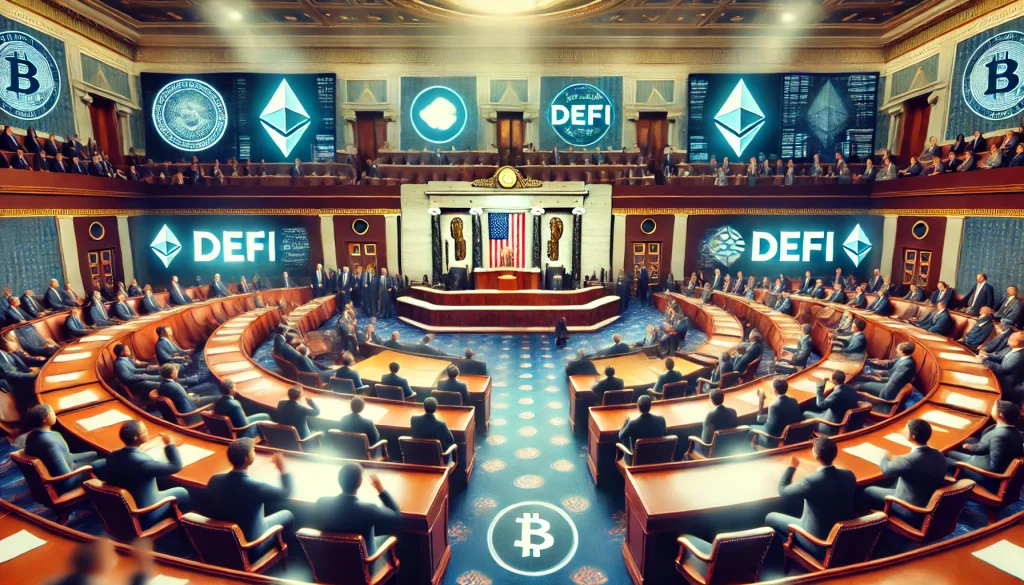As the battle for control over decentralized finance (DeFi) intensifies in Washington, the absence of a clear stance from former President Donald Trump is fueling speculation. On one side, Democrats and Republicans are clashing over how to regulate this emerging sector. On the other, Trump’s silence on the matter has left many wondering if his neutral position is strategic or merely a sign of disinterest.
Spotlight on DeFi: An Era of Congressional Scrutiny
September 10, 2024, marked a pivotal day for the DeFi industry, as the U.S. Congress held its first-ever hearing on decentralized finance, titled “Decoding DeFi: Breaking Down the Future of Decentralized Finance.” Led by Congressman French Hill, the hearing lasted for nearly two-and-a-half hours, bringing both optimism and concern to the forefront of the discussion.
For many in the financial sector, this hearing signaled a turning point in how DeFi is perceived by U.S. lawmakers. As expected, the hearing revealed a deep divide between the parties. Republicans, represented by Congressman Hill, championed DeFi’s potential to reshape financial markets by eliminating intermediaries through autonomous, self-executing code. Hill and his colleagues envisioned a future where decentralized systems could replace traditional financial structures, creating a more efficient, transparent market.
Hill’s enthusiasm was evident when he stated, “By substituting intermediaries for autonomous, self-executing code, decentralized finance can shift the way financial markets and transactions are currently structured and governed.”
On the other side of the aisle, Democratic lawmakers voiced significant concerns. For them, DeFi represented more than just technological advancement—it posed potential risks, particularly in relation to enabling criminal activity. They argued for stricter oversight to mitigate these dangers, advocating for more robust regulations to protect investors and prevent misuse of decentralized systems.
Divergent Opinions on DeFi: Opportunity vs. Risk
The Congressional hearing quickly turned into a battlefield of contrasting opinions. For Republicans, the promise of DeFi’s decentralized nature was the primary focus. They saw the potential for tokenization to revolutionize finance. But for Democrats, particularly Congressman Brad Sherman of California, DeFi was a potential threat to the U.S. financial system.
Sherman didn’t hold back, describing DeFi as a tool for the ultra-wealthy to evade taxes. In his words, “What we have here is an effort to liberate billionaires from income taxation.” His concerns echoed those of many within his party, who believe that DeFi could become a haven for financial criminals.
To counter Sherman’s argument, Peter Van Valkenburgh, Director of Research at Coin Center, offered a more nuanced perspective. He acknowledged the risks of tax evasion but emphasized that DeFi’s transparent, decentralized ledger makes it difficult for bad actors to hide their activities. For Van Valkenburgh, the problem lay not in the technology but in the lack of clear guidance from regulatory bodies like the IRS.
“Tax evasion is a crime. It should be aggressively policed. However, this does not warrant creating a 100% surveilled and controlled financial system,” he stated. His position underscored the broader issue in the crypto space: the absence of clear tax guidelines for cryptocurrency users.
Van Valkenburgh went on to highlight that many Americans want to comply with tax laws but lack the necessary information on how to do so within the decentralized world of crypto. “Getting clear tax guidance from the IRS has been a challenge. Many crypto users are unsure of how to pay their taxes when they earn capital gains or wages on these networks,” he added.
On the flip side, Mark Hays, Senior Policy Analyst at Americans for Financial Reform, argued that DeFi is too volatile and filled with scams to be trusted. Hays painted a grim picture, where investors often face devastating losses, and regulatory oversight is desperately needed to protect the market from further harm.
For Amanda Tuminelli, Chief Legal Officer at DeFi Education Fund, the discussion should focus on financial inclusion. She pointed out that traditional financial systems often act as gatekeepers, denying access to individuals for various reasons. In contrast, DeFi platforms provide open access to anyone with an internet connection, which she believes is a game-changer for those historically excluded from financial systems.
“Big banks can and do deny access to the system for discriminatory reasons or no reasons,” she said. “DeFi, on the other hand, is the epitome of financial inclusion.”
Tuminelli’s argument highlights a key benefit of decentralized finance: its ability to democratize access to financial services. However, she also stressed that regulations for DeFi should consider the fundamental differences between decentralized systems and traditional finance. Treating them the same, she argued, would stifle innovation.
Trump’s Silence: What It Means for the Crypto Community
While Congress was deep in debate over DeFi, the broader crypto community was watching the second presidential debate of 2024. Vice President Kamala Harris faced off against former President Donald Trump in what was expected to be a critical moment for the crypto space. Yet, surprisingly, there was no mention of cryptocurrency, blockchain, or DeFi during the debate.
This silence was especially striking given Trump’s evolving position on cryptocurrencies. Once a vocal critic, Trump has softened his stance in recent months, likely in an effort to attract pro-crypto voters. However, both he and Harris avoided the topic altogether, focusing instead on more traditional economic issues.
Following the debate, Bitcoin saw a minor dip, falling from around $58,000 to $56,000, while Ethereum experienced a similar decline, dropping about 0.5%. This market reaction may have been influenced by the lack of clear support for the crypto industry from either candidate.
Interestingly, Trump’s odds of winning, according to online betting platform Polymarket, dropped from 52% to 50% after the debate, despite no direct discussion of crypto. The debate may have shifted public perception, but the absence of crypto-related dialogue left many wondering where Trump and Harris truly stand on the issue.
What’s Next for DeFi and Crypto in the U.S.?
The ongoing debate over DeFi in Congress and the lack of attention to crypto in the presidential race point to a larger issue: uncertainty about the future of decentralized finance in the United States. Democrats have consistently raised concerns about the risks associated with crypto, while Republicans are more open to its potential benefits. But without a unified approach, the regulatory landscape remains murky.
As the 2024 elections approach, the fate of DeFi will likely hinge on how the next administration handles the growing sector. If Trump or another pro-crypto candidate takes office, we could see more favorable policies towards blockchain and decentralized systems. On the other hand, if Democrats continue to hold power, DeFi may face increased regulatory scrutiny.
Both parties seem to agree on one thing: crypto and DeFi are here to stay. What remains to be seen is how the U.S. government will choose to regulate these innovations, and whether the upcoming election will bring about a clearer direction for the future of finance.
Conclusion
The U.S. Congressional hearing on DeFi highlighted the deep divide between Democrats and Republicans over the future of decentralized finance. While some see it as a revolutionary force that can democratize finance and remove intermediaries, others view it as a risky technology that could enable criminal activity. Amid this heated debate, former President Donald Trump has remained notably silent, leaving the crypto community to wonder where he stands.
With the 2024 election looming, the future of DeFi and crypto regulation in the U.S. hangs in the balance. As the regulatory landscape evolves, it will be crucial for lawmakers and the public to strike the right balance between innovation and security.


